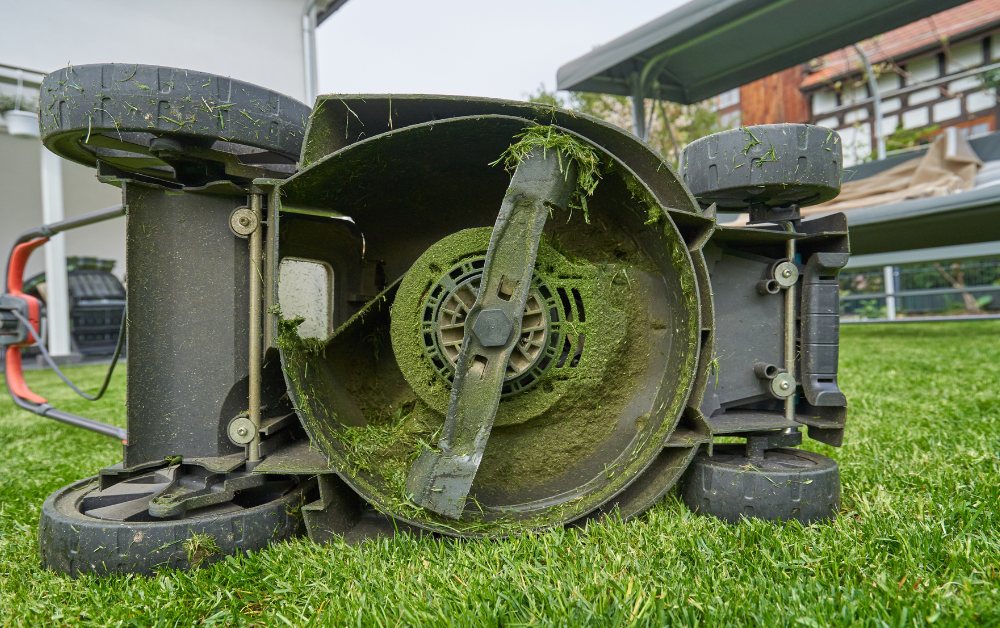The Top 10 Lawn Care Mistakes to Avoid

27 July 2023
When it comes to lawn care, there are some activities that your turf will praise you for, but others that should be avoided. In this blog, we look at what lawn care mistakes to avoid that can cause more damage than good.
1. Infrequent mowing
One common lawn care mistake is not mowing your lawn frequently enough. Not mowing your lawn frequently can result in having an overgrown lawn and can cause extra stress to your grass. This stress can make your lawn thin and sparse, especially after mowing.
So how should I mow my lawn? We recommend using the one-third rule when mowing. This rule looks at mowing your lawn regularly enough so that only one-third of the leaf is removed with each pass. During the cooler months, the lawn will be growing at a slower rate. This means you won’t need to mow as frequently. However, during the warmer months, you will need to mow more frequently to keep up with accelerated growth.

2. Compacted soil base
When a lawns soil base is compacted, it can be more difficult for water, nutrients, and air to travel down to your lawn’s roots. It also makes it more difficult for your lawn to establish a good root system. Some issues that can arise from a compacted soil base include drainage issues, bare patches, weeds, dry patch, and fungal diseases, to name a few.
What can a compacted soil base be caused from? Compaction mainly occurs when there is heavy traffic on your lawn and a lack of water.
So, what should you do if your lawn has a compacted soil base? We recommend giving your lawn an aerate with a garden fork or use a tyne aerator to help alleviate compaction.
3. Over-fertilising your lawn
Applying fertilisers to your lawn is a good thing and can help improve the health of your lawn. But too much of a good thing can cause harm to your lawn. Over-fertilising your lawn will cause sudden plant growth. The problem with this is that the roots won’t experience the same amount of rapid growth and will then be unable to supply the water and nutrients your grass needs. In addition, as fertiliser is primarily made up of mineral salts, excessive fertilising will cause salts to build up in the soil, making it difficult for water to be absorbed, drying out your grass, causing discolouration and possibly even plant death if bad enough.
When applying fertilisers to your lawn, it is best always to follow the correct application rate and instructions and ensure you water correctly after application.

4. Letting weeds invade your lawn
Having weeds grow your lawn is expected from time to time. But if weeds are left untreated, they will continue to grow and spread throughout your lawn. Therefore, treating weeds as they appear to prevent the spread is best.
5. Watering your lawn incorrectly
When it comes to watering your lawn, there are a few golden rules to follow:
- Water your lawn for longer, less frequently.
This will help encourage your lawn to grow its roots deep down into the soil profile, helping improve the drought tolerance of your lawn.
- Water in the morning before the heat of the day.
It is best to avoid watering in the late afternoon and evening to help stop your lawn from sitting damp overnight. Watering at this time can lead to fungal issues as the lawn will sit damp for a long period of time. Watering in the morning can help prevent these issues from arising.

6. Incorrect application of lawn care products
One common lawn care mistake is incorrectly applying lawn care products. When using lawn care products, it is vital to ensure you read and follow application instructions and rates. If these are not followed, the product may be ineffective with what you want to achieve. It can cause other issues, including burning and in extreme cases, killing your lawn. If you are unsure of how to apply a lawn care product, it is always best to check with the product manufacturer before application.
7. Not enough sunlight
Just like all plants, grass too needs sunlight. Sunlight allows grass to produce the food it needs to survive. Glucose, otherwise known as sugar, is produced by the grass and is used as food to help your lawn grow. Without sunlight, your lawn will not be able to produce glucose, causing the grass to thin out and die.
While all turf varieties need sunlight to thrive, some are more shade tolerant than others. This means some varieties can better absorb sunlight than others. Generally, the wider the leaf blade on the grass, the more shade tolerant a turf variety will be. If you are unsure of what turf type is best for your area, it is best to have a chat with us.

8. Poor drainage
A lawn with poor drainage can develop many problems. These include fungal, disease, weed infestation and even lead to your grass dying. So, correcting any issues with your lawn’s drainage will help prevent issues from arising next time you get a large downfall of rain.
9. Blunt mowing blades
Another common lawn care mistake is mowing with blunt mower blades. Did you know your mower blades will go blunt over time, like a razor? Blunt mower blades will rip at your grass. This not only looks bad but isn’t good for the health of your lawn. If you suspect that your mower has blunt blades, or are wanting to do a routine check-up, tilt the mower up with the front wheels pointing upwards and the handle flat to the ground.
When inspecting the mower blades, if they have any cracks, bends, extremely thin blades or even holes in the blades fin – then your blades need to be replaced. If there is still plenty of meat left on your blades and they are in their correct shape, they may simply need to be sharpened.

10. Soil pH is too acidic or alkaline?
If your lawn is not performing very well or not responding to fertiliser, this could be due to your soils pH. pH is a measure of acidity and alkalinity. Most lawns like to be in the 6 to 7.5 range for optimum performance. Measuring a soil’s pH is easy to do and doesn’t involve a complicated scientific experiment. All you need is a pH testing kit and they are readily available at hardware stores and nurseries.
If your soil’s pH is outside the recommended range of 6-7.5 you may need to adjust this.

As always, if you have any more questions please don’t hesitate to contact us for free expert advice on 1800ALLTURF (1800255873) or 07 5543 8304.
WOULD YOU LIKE MORE INFORMATION?
Contact us for expert advice, or come & say hi at our office in Tamborine!


